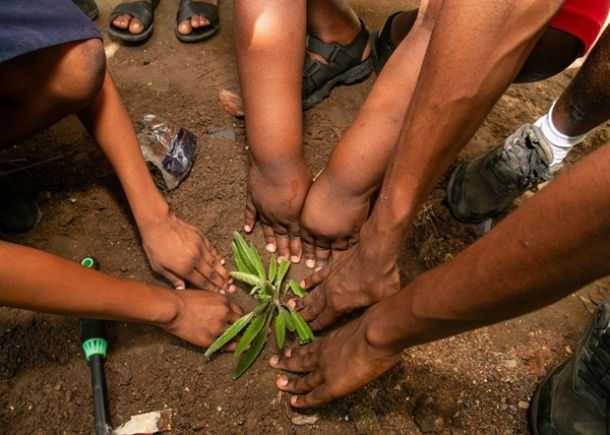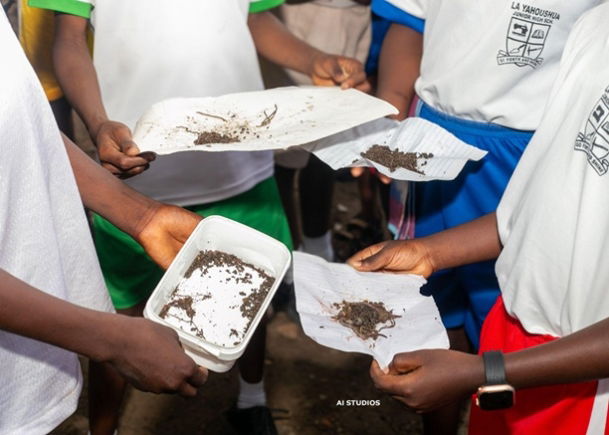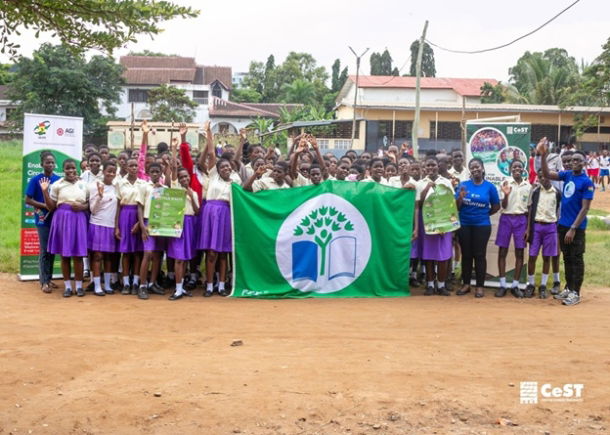
By Emmanuel Akumun, National Operator, Eco-Schools Ghana
This year, Ghana’s classrooms transformed into green laboratories and its schoolyards into hubs of healing, thanks to an exciting wave of eco-conscious activity powered by the Foundation for Environmental Education’s (FEE) annual Global Action Days (GADs) campaign, carried out through its Eco-Schools and Young Reporters for the Environment Programs which are operated in Ghana by the Centre for Sustainable Transformation (CeST).
Through the Eco-Schools Program, CeST rallied young learners across the country to roll up their sleeves and get their hands dirty, literally, as part of the Global Action Days (GADs) Campaign themed “Ecosystem Restoration”.
The Global Action Days (GADs) is an annual campaign led by the Foundation for Environmental Education (FEE), which mobilizes Eco-Schools and Young Reporters for the Environment in over 101 countries, as well as thousands of people around the world to take action on environmental issues. The campaign encourages students to move “From Words to Action” by leading sustainability initiatives in their schools and communities. With nature under threat and the planet’s ecosystems stretched to their limits, this year’s campaign aligned with the UN Decade on Ecosystem Restoration, urging people worldwide to take tangible steps toward repairing their relationship with the environment. In Ghana, CeST took that call to heart, and schools.
Back to the soil: Meeting schools where they are
While digital registration and online toolkits are central to FEE’s global campaign, CeST recognized a unique local reality: many Ghanaian schools, especially in underserved communities, are less likely to engage with an online-only campaign. So, when CeST received a modest grant from FEE, the team chose to maximize impact the old-school way, by going straight to the schools.
Armed with 100 printed and visually engaging GADs flyers, CeST staff and volunteers embarked on a boots-on-the-ground outreach effort, visiting 24 schools across Greater Accra and the Eastern Region to raise awareness and stir enthusiasm. These visits were more than a drop-off; they included personal explanations, awareness of the activities to be featured, and warm encouragement to help schools feel part of something bigger, something global.
Ecosystem restoration in action: The first five schools dig in
Despite an early hiccup arising from the campaign’s official timeline (April 26–May 6) coinciding with Ghana’s Easter school holidays, CeST pushed ahead with post-holiday engagements. And it paid off. By mid-July, five enthusiastic schools had kicked off activities under the Ecosystem Restoration theme:
- Divine Provision School, Labone
- Kpong Presby Junior High School, Kpong
- Association Communities Basic School, La
- La Salem Junior High School, La
- La Yahoushua Basic School, La

Students presenting their earthworms after a Soil Safari (Worm-finding exercise) to demonstrate the role of worms in the soil and the broader ecosystem
Soil safari: Not just dirt
These schools came alive with Soil Safaris, where students explored the unseen life teeming beneath their feet by examining the world of worms and their role in maintaining healthy ecosystems. By breaking down organic matter, enriching soil with nutrients, and improving its structure for water and air flow, worms play a crucial part in sustaining healthy ecosystems. Imagine an outdoor activity where students study wriggling worms, decomposing leaves, and busy beetles. That's what a Soil Safari looks like. Beyond the fun and discovery, it reinforced a serious message: life beneath the surface is as critical as what grows above it. With guided explorations, students learned about how earthworms aerate the soil, how microbes cycle nutrients, and how every handful of healthy soil is its own ecosystem. It was ecosystem restoration made real, under their shoes.
Growing tomorrow: The power of tree planting
Similarly, students took part in tree-planting activities, a signature Eco-Schools action, and one of the most impactful actions anyone can take to restore and protect the environment, as trees are vital pillars of ecosystems, purifying the air, enriching the soil, supporting biodiversity, regulating the water cycle, and combating climate change by absorbing carbon dioxide. Through planting trees, students were not just placing seedlings in the ground; they were contributing to the recovery and resilience of natural systems. This hands-on activity helped them understand the vital role trees play in maintaining the balance of life and why restoring green spaces is essential to healing damaged ecosystems. It was a relevant and empowering learning experience that connected young people to nature, encouraged long-term thinking, and showed that every small action, like planting a tree, can help rebuild a healthier, more sustainable planet. These small, symbolic acts of restoration now dot the campuses, living testaments to the role young people can play in healing the planet.
In total, 370 students and 24 teachers participated in this year’s GADs campaign, sparking vibrant discussions about soil biodiversity, plastic pollution, human reliance on single-use plastics, waste colonialism in Ghana, climate resilience, and what it means to heal the earth or restore our ecosystems.
Challenges: Timing vs. passion
While enthusiasm ran high, the school calendar proved challenging. The GADs' official campaign window clashed with the Easter break, and when schools resumed, academic schedules were packed. Still, CeST and the Eco-Schools team navigated the tight timelines with flexibility, working around exam timetables and term constraints to ensure that eager schools could still participate, even if outside the FEE-mandated dates.
The power of collaboration
Behind every impactful campaign is a strong partnership, and this year’s GADs campaign in Ghana was no exception. CeST collaborated with the Ghana Recycling Initiative by Private Enterprises (GRIPE), whose support brought added depth, energy, and expertise to the campaign. As students eagerly participated in Soil Safaris and tree planting, GRIPE was there, providing refreshments to keep spirits high and energy levels up. But beyond the refreshments, GRIPE offered something even more valuable: knowledge.
In line with their mandate to integrate sustainable waste management solutions, with a focus on plastics, to reduce plastic waste pollution, GRIPE facilitators used the opportunity to engage students in lively, practical conversations about waste segregation and recycling. From plastic bottle usage to the importance of clean-up culture, their presence added a vital layer to the day’s activities, reinforcing the message that ecosystem restoration must go hand-in-hand with waste management. This partnership exemplifies how the private sector and civil society can work hand-in-hand to educate the next generation and multiply impact. By combining CeST’s environmental education framework with GRIPE’s waste management expertise, the GADs Campaign in Ghana became not just informative but truly transformative.
From ground to global: Social media sparks
To give the world a glimpse of Ghana’s growing environmental consciousness, CeST has been actively sharing updates across its social media platforms such as TikTok, X, Instagram, and Facebook. Photos of students digging soil, planting trees, and posing with their flyers have started to roll in under hashtags like #GlobalActionDays, #SoilSafari, and #EcoSchoolsGhana.
These digital stories don’t just celebrate participation; they inspire replication, inviting other schools and communities to join in and do their part. Hopefully, these successes will inspire more schools to sign up and participate in the campaign come April 2026.

Students of Association Communities Basic School, Labone, with the Eco-Schools team from CeST, after marking the Global Action Days Campaign 2025